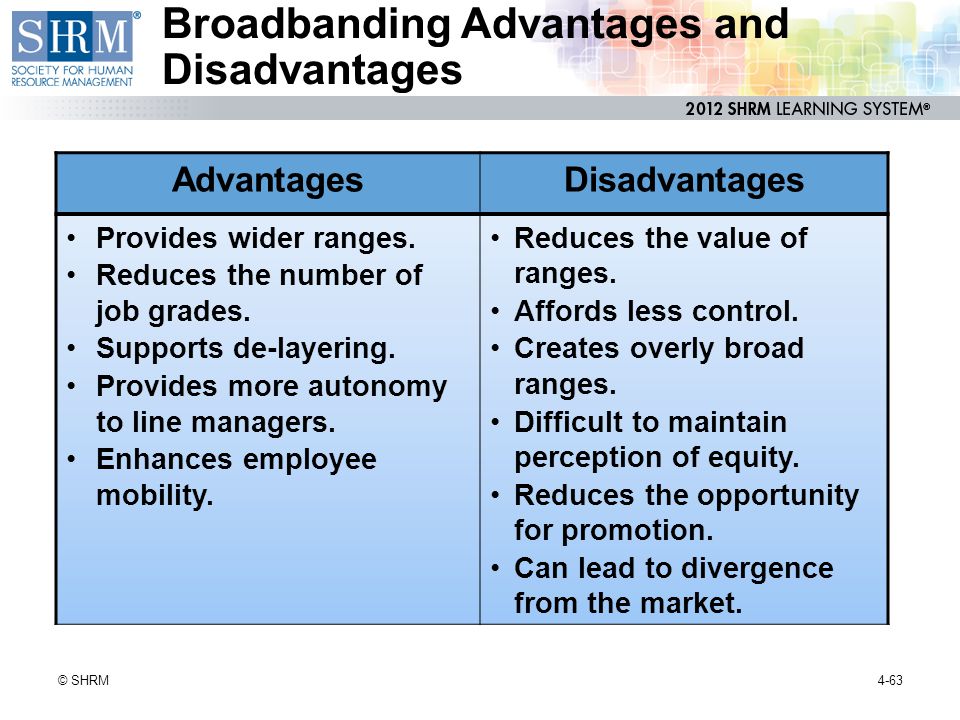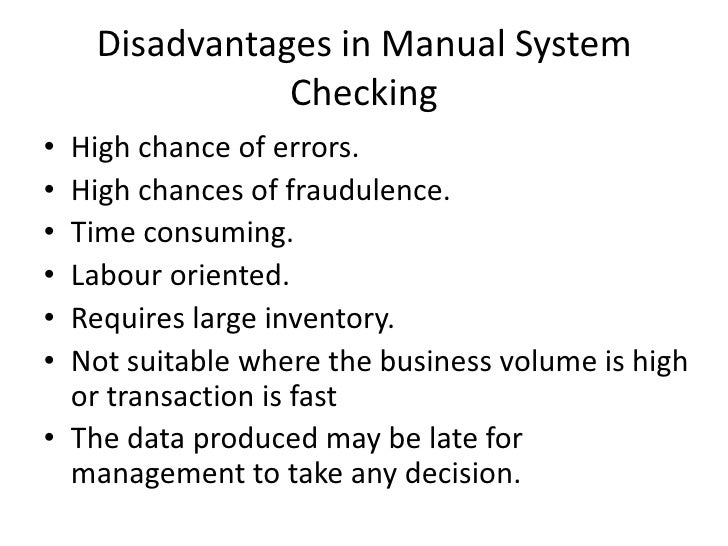- Advantages Of Manual Payroll System
- Advantages Of Manual Storage System
- Advantages Of Manual System Information
Dear Sir, I would like to know the answer for the following question: Which of the following is an advantage of manual systems? They have fewer errors than automated systems B. They are easier to audit than automated systems C. It is easier to correct errors than in automated systems D. Quick Answer. One of the most important advantages of a computerized system is it saves time for businesses. Other advantages include automation, accuracy, cost-effectiveness and easy data access. In addition, computerized systems are secure, have high speed, are scalable and reliable. Computerized systems involve making use. Advantages and disadvantages of using manual accounting system accounting? An advantage to using manual accounting systems is that there is a written record of transactions.
This topic contains 2 replies, has 2 voices, and was last updated by 4 years ago.
- September 16, 2015 at 11:59 am
I think it could be B or C. If pushed I would choose B
A is wrong. Manual systems are more prone to error eg on calculating VAT or an invoice value.
B Many people would say that manual systems are easier to audit. Records in computer systems are less visible though specialist computer auditing techniques help.
C Manual system errors are generally easier to correct.
D is wrong. Automated systems can be protected by passwords, back-ups, etc.
Dec 08, 2018 The title of the episode 'Defending Your Life' is also the title of a 1991 movie starring Albert Brooks. In the movie, when people die they must defend their life in an afterlife court. If they can prove they have conquered their fears, they pass on to the next phase of existence. If not, their soul is sent back to Earth. Oct 14, 2011 Directed by Robert Singer. With Jared Padalecki, Jensen Ackles, Jim Beaver, Alona Tal. Sam and Dean investigate murders of people who have. Supernatural season 7 episode 4.
Related Articles
- 1 The Advantages of Manual Vs. Computerized Accounting
- 2 The Advantages of Manual or Computerized Accounting
- 3 Differences Between Manual & Computerized Accounting Systems
- 4 What Is LF in Accounting?
With the plethora of software options available for accounting and bookkeeping tasks, manual systems may seem a thing of the past. Yet double-entry manual accounting proves robust enough that many accounting applications re-create the features of the double-entry system within their software, such as the power and natural error-correction potential. When you weigh the options, manual entry systems may still have a place in your offices.
How Manual Accounting Works
Any contemporary accounting system records transactions relating to business activity with a view to communicating your company’s financial health to stakeholders, whether they are staff, bank managers or private investors. The systems is separated roughly into four cycles:

- Revenue
- Purchase
- Payroll
- General Journal
Manual accounting systems use physical records, pads of paper and books, onto which transactions are entered by hand. Accounting pages have four or more printed columns and multiple rows, natural divisions for the necessary information, such as date, description and dollar amounts. Numerical entries typically have space for every digit.
Journals and ledgers comprise the working and final copies of documents, often with separate books for the various accounts. Cash sales could be one set, for example, while payroll may be another. The results of these working documents are usually combined in the company’s general ledger.
Advantage: Error Correction
Despite the convenience and market penetration of computer-based accounting systems, manual accounting still offers several advantages that make it a viable alternative. The first is error correction. Double-entry accounting, attributed to Luca Pacioli, a 15th century Italian, provides a natural way to guard against data entry errors and number transpositions. Every transaction gets entered as a debit in one account, and a credit in another account. Trial balances compare all debits and all credits. If these don’t match, an error is made somewhere in the accounts.
Advantage: Data System Errors and File Corruption
Computer systems store data in ways that aren’t commonly understood by many users. Opening the wrong file with old data or encountering a data file with digital errors can ruin the validity of your current data. Manual systems use a single file, the ledger, for each account. There’s no other version with similar data that may be confused.
Advantage: Always Accessible
Power or internet outages won’t prevent you from working on accounts unless you’re thrown into complete darkness.
Disadvantage: Data Entry Errors
Double-entry accounting in a manual system is laborious, since every transaction must be recorded by hand, twice. Many accounting programs use a double-entry method, but second entry is created automatically. While this won’t stop a wrong number from being entered, it does eliminate discrepancies between the first and second entries.
Disadvantage: Potential Loss of Physical Copies
While digital data can be corrupted, effective backups can protect data, including copies off-site, such as in cloud server storage. Journals and ledgers, being physical books, are prone to loss. Theft or fire could mean that all of a company’s accounting data is lost. Duplicating and storing the general ledger off-site can be a time-consuming task, compared with many digital storage options.
Disadvantage: Knowledge of Accounting Procedures
Unlike many commercial software packages, manual accounting system aren’t optimized for ease of use, nor can you expect client support or proprietary help. A bookkeeper or accountant will be necessary to start up and maintain your manual accounting system.
Advantages Of Manual Payroll System
References (3)
About the Author
With degrees in Photography and Recorded Music Production, Scott spent over 20 years as an Operations Manager with Kodak before starting a second career as a freelance content creator specializing in business, accounting and tax topics. Periodicals include FIVE Magazine and Your Business for the Your Magazines Canada group and online clients include TurboTax, Office Depot, Hyundai USA and VISA. www.shpak60.ca
Advantages Of Manual Storage System
 Cite this Article
Cite this Article